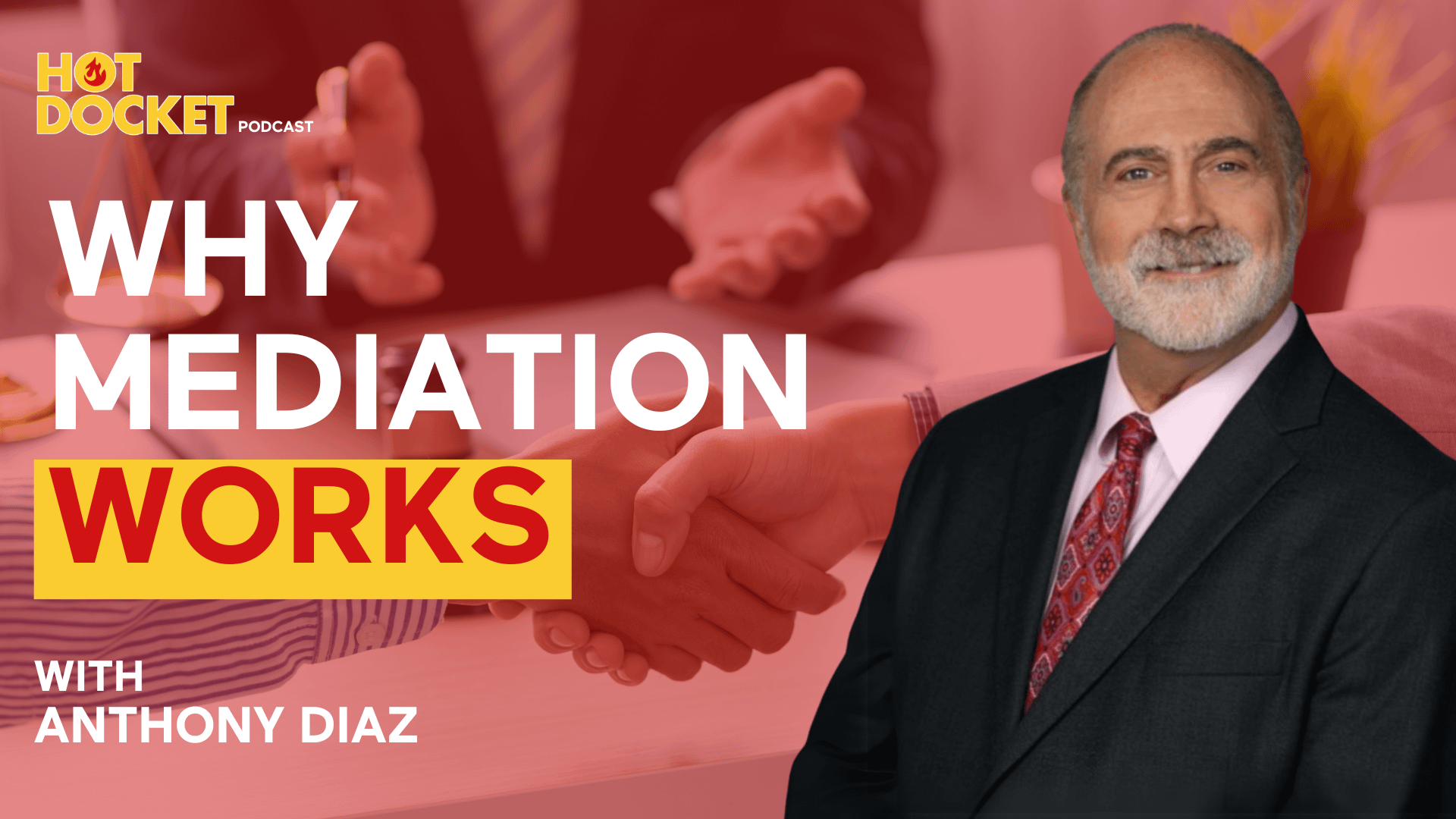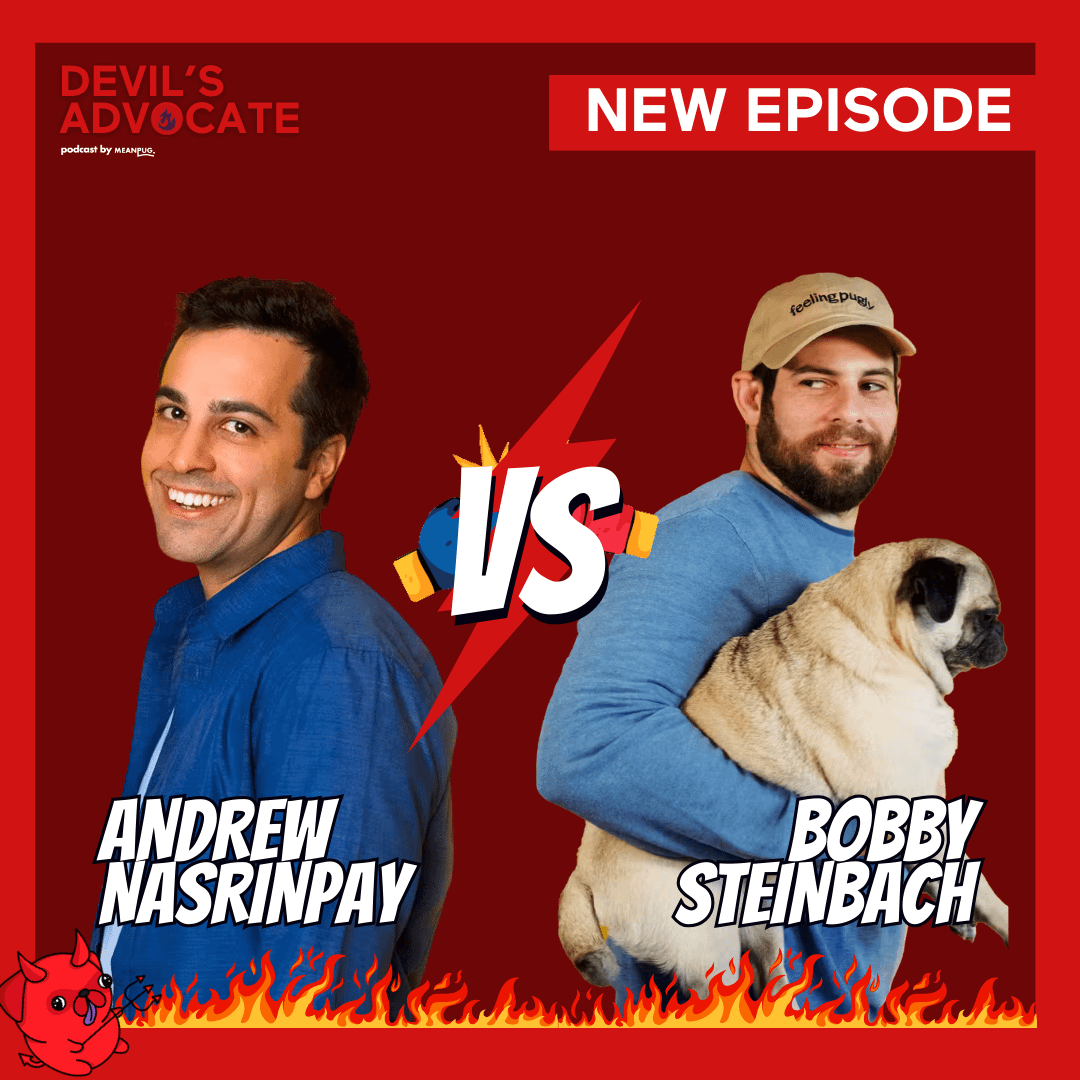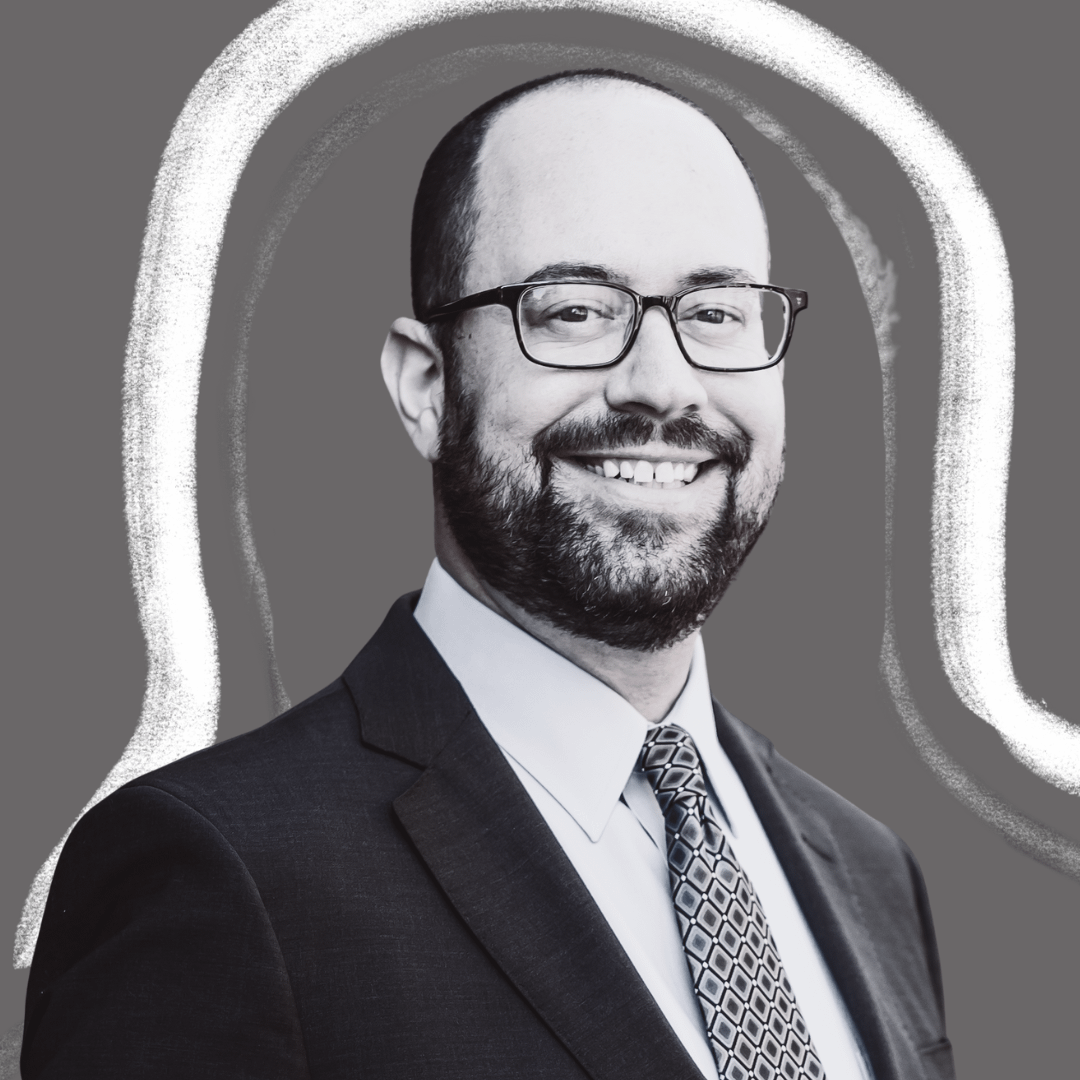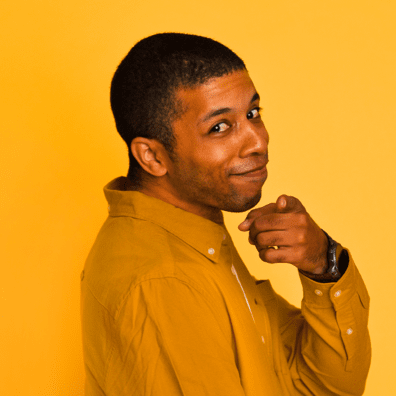[00:00:00] Anthony Diaz:
Our job is not always to do what our client wants us to do, but is that in the best interest of our client? And, and I take that to heart and I'm hoping a lot more attorneys look at that. I do well in my practice and that's not from making a lot of money on each client is doing a good job in getting referrals and I'm so busy that I'm making about as much as.
[00:00:26] Anthony Diaz:
Other attorneys do that. Don't look at it that
[00:00:29] Bobby Steinbach:
way, and I have less stress. Welcome to Hot Docket, the show where we talk about winning marketing strategies that have built the most successful law firms.
[00:00:36] Andrew Nasrinpay:
Join us every two weeks for the latest trends and tactics to grow your law firm. Welcome to the Hot Docket Podcast.
[00:00:42] Andrew Nasrinpay:
Today we're being joined by Anthony Diaz, the peacemaker. And we're gonna be talking about family law.
[00:00:53] Bobby Steinbach:
I can immediately tell that I like Anthony because he's got a brand like out the gate. The peacemaker is one of the best, like one liner brand named things that I've seen in law in a long time. So I'm very excited. How'd you about, speaking of like, how'd you get there? How did you land on peacemaker? Wow, that's a really good
[00:01:14] Anthony Diaz:
question.
[00:01:16] Anthony Diaz:
So took a lot of courses like a lot of us attorneys do, how to brand, how to market and things like that. And I was kind of stumbling along and peace has always been a mantra of mine, just personally and uh, so I was thinking about peace, peace, peacemaker. Well that sounds, that sounds really good. And I've always been a peacemaker even.
[00:01:38] Anthony Diaz:
Since I was a kid, people would come to me and solve stuff and you know, 'cause I was always pretty even keeled and whatnot. And, and I had a Italian family. And Italian families are, you know, not so even keeled. So, uh, so they used to come to me. Uh, funny story, when I started going, you know, as the peacemaker, somebody came up to me and they said, do you know what a peacemaker is?
[00:02:04] Anthony Diaz:
I said, yeah, you go and you solve concert. No, no, no. It's. It's a rifle. So back in the wild West, that's what they would call. The peacemaker is a rifle 'cause that's how you solve disputes. So I was like, no, I'm not that, you know, not that bad. I don't have any guns. So it was a pretty interesting, I didn't know that, but it's, it's become a brand and it's become what I've been known for in Florida and around around the country.
[00:02:33] Anthony Diaz:
So I'm blessed to have been able to land on something that people resonate with.
[00:02:39] Andrew Nasrinpay:
Any moment now you're gonna get a letter in the mail from like Winchester for some sort of, uh, trademark violation. Well, it
[00:02:45] Bobby Steinbach:
made me think like, it, it'd be amazing if you now go in against like a very aggressive divorce lawyer or something who also goes by the peacemaker and it's like peacemaker versus peacemaker.
[00:02:57] Bobby Steinbach:
Different meaning. That's funny. Different person. Walk us through the evolution of the firm. Like, uh, did you always kind of envision that you'd focus more on like the uncontested? Did you ever start like do more of the litigation side and kind of go to court and do all that stuff? How, how'd you get where you are?
[00:03:13] Anthony Diaz:
So interesting is that I didn't start off doing family law and private practice. You know, I, I worked for the state attorney's office, I did some private work other places, and then I started to do criminal defense 'cause. As a state attorney, that's a natural progression and, and had a criminal defense practice.
[00:03:35] Anthony Diaz:
And then I started ge getting calls from my clients on, you know, do you do divorce? Do you do family? And I never did. I never really wa wanted to. I've been divorced a couple of times. Didn't really wanna have to go down that road with anybody else, but, but I looked at that would really be a, a neat way to help people.
[00:03:54] Anthony Diaz:
Have a peaceful resolution to what is normally not a peaceful process. So I took on family law, I was a CPA my first career, so financial resolution of things came naturally 'cause that's just what my, uh, first career was. And, and I stopped doing a criminal defense because family law just got to be so busy that I really wanted to, to focus on that.
[00:04:20] Anthony Diaz:
And I've been. Focusing on that for almost 20 years now.
[00:04:25] Bobby Steinbach:
How widespread of a problem have you seen it be that lawyers in family law aren't always operating on in the best interest of their client and they're more like going to court so that they could rack up? Fees and like they're taking unnecessary steps.
[00:04:42] Bobby Steinbach:
Like, I don't know, because, you know, one of the people that are filing like just wants to spite their partner and it's not actually in the best interest of the case. Like how often do you see, um, lawyers taking advantage of that? It,
[00:04:55] Anthony Diaz:
it happens a lot and, uh, probably, I think hap it's happened more often in the past, I think.
[00:05:03] Anthony Diaz:
The new generation of lawyers are a little bit more mindful and they're just brought up a different way. But I've had attorneys that just feed off of their client's, um, emotions. 'cause divorce is an emotional, uh, event in your life and my view as. Counselor at law. That's kind of the old way of, of, of looking at things.
[00:05:31] Anthony Diaz:
But we're our client's counselor and I think it's our job to say, Hey, I know you wanna do this, and that sounds like a great idea. Kind of here is what that really looks like in court, or here's how that's gonna ramp up the case. And now they're gonna go ramp it up, and then you feel like you have to ramp it up and there's no end.
[00:05:52] Anthony Diaz:
So why don't we look at it this way? And, and I don't mind getting paid, but you're gonna pay me a lot more. Then, then you'd like to, and you're gonna be mad at me at the end, and I don't want you to be mad at me. Um, I want you to have a good outcome. And, but, but not all attorneys are, are like that. They're either in it to make a lot of money and pay for their cars and houses, or they're.
[00:06:17] Anthony Diaz:
Rationalization is, well, this is what my client wants me to do. Well you, you, you know, our job is not always to do what our client wants us to do, but is that in the best interest of our client? And, and I take that to heart and I'm hoping a lot more attorneys look at that. You know, I do well in my practice, and that's not from making a lot of money on each.
[00:06:40] Anthony Diaz:
Client, it's doing a good job in getting referrals and I'm so busy that, you know, I'm making about as much as other attorneys do that don't look at it that way, and I have less stress. So I like my way of doing things.
[00:06:58] Andrew Nasrinpay:
Do you believe that most couples should go through mediation prior to anything else?
[00:07:04] Anthony Diaz:
So like in Florida you are, you are ordered to go to mediation. If it's a litigation case, you can't see a judge before mediation because most mediations. Settle. There's about a 90 to 95 success rate in mediations in Florida. And so I'm a high proponent of mediation. I am a certified mediator. And, and I think any out of court solution, um, is better than rolling the, the dice with a judge.
[00:07:37] Anthony Diaz:
Uh, so I think, um, clients are learning more and more about that and they're like, you know. I really would like to have this, but I might not even get that if I go to court and maybe if I can negotiate and get some of what I need and what I want, that's better than not getting anything. So mediation, you know, is a great way to not only have more of a chance of, of getting a fair outcome, but to keep the emotion level down and, and not.
[00:08:08] Anthony Diaz:
Really ramp it up, which happens when you, when you go to trial and you go to judge, it's, it's a very high emotion. So a good way of keeping that more peaceful is mediation, collaborative divorce, you know, a lot of the other out of court solutions.
[00:08:31] Andrew Nasrinpay:
Yeah. I thought you were gonna say something. No, that's a great answer. Yeah. The um, so do you. Frequently see attorneys that, uh, are the exact opposite where they want to get the most for their client. They're hell bent on going to trial, and we've seen that. Uh, family lawyers typically fall in a few different buckets.
[00:08:54] Andrew Nasrinpay:
They're the peacemakers who wanna push for mediation, who want a good outcome, and then there are the people. Their whole business model relies on a couple of high net worth clients. That have to go all the way through trial and end up racking up a ton in fees. Um, have you seen that in your career where like, uh, there's just a few bad seeds like that, that kind of tarnish the name of family lawyers across the board?
[00:09:21] Anthony Diaz:
Well, absolutely. There, there are, and in, in the central Florida community, we all know those attorneys. I, you know, we call them those attorneys, but it's, it's the ones that you know. W when you get hired and you ask, you know, who is the, who is your spouse's attorney? And they said that like, okay, this is gonna trial.
[00:09:40] Anthony Diaz:
It's just, and I remember I was mediating cases in another county and there was an attorney, really nice guy. He would never settle a mediation. Never, ever, ever. And that was his motto. He was like, there's not enough time to make a decision. Let me sit on it. And let me think about it. And wound up going to trial all the time.
[00:10:03] Anthony Diaz:
He just loved to go to trial. There were some attorneys that just loved to go to trial. There's an adrenaline rush and I can understand that. 'cause when I was at the state attorney's office, we did a lot of trials and there was just this, this emotion that you get in, but with the state attorney's office, you're representing the state and victims and there is kind of a purpose in there.
[00:10:24] Anthony Diaz:
And family law, the way I look at it. Unless it's such an issue that is so like either or like where you can't split the baby, there's no case that should go, go to trial. Can can you give an example of that? Absolutely. Relocation. That's, um, it's in the statute in Florida where you either need the agreement of the parties, which usually never happens, uh, or you need a court order.
[00:10:52] Anthony Diaz:
So if somebody wants to relocate and the other person doesn't, you really can't say, well, instead of moving to Texas, you'll, can you move closer? Well, no, it's still a relocation, so it's either a relocation or not. So a lot of times if, if. Your client wants that job, or you have a client that just doesn't want, you know, the, the child to be moved outta state, that's one of those that's going to need, um, a judge.
[00:11:21] Anthony Diaz:
Now, I will tell you in saying that I've had cases that, uh, handled by the collaborative process and we were able to come up with creative solutions like. Putting off the relocation for a year, uh, so that the parent that wanted to stay in the state gave them time to relocate to the state that the parent wanted to move to.
[00:11:47] Anthony Diaz:
So, you know, the neat thing about out of court, I. Resolutions is you're not relying on a judge who doesn't have the time to make decisions. You have the time to be creative and to think out of the box and wow, I didn't think about that. Well, a judge would've never ordered that. Well, it doesn't matter whether the judge would've ordered it or not, as long as it's not illegal and it's something the parties want to do.
[00:12:10] Anthony Diaz:
So even something as clear cut as reation that. Rarely get settled. I have seen those cases settled without a court resolution. 'cause you have the time and the energy and the, and the people that are invested in finding a solution for the parents.
[00:12:30] Andrew Nasrinpay:
So the, the cases that go to trial and it's kind of all about relocation.
[00:12:35] Andrew Nasrinpay:
Um, what percentage of the time, if you had to guess, does. Trial. Go in favor of what is actually good for the child?
[00:12:46] Anthony Diaz:
That's a good question. I, I don't know the percentage. I know if you
[00:12:50] Andrew Nasrinpay:
had to guess, like if you just had to
[00:12:52] Anthony Diaz:
I would say like gut feeling. Yeah. I would say most of the time the relocation is not, is not approved.
[00:13:01] Anthony Diaz:
'cause there are, it's. Because most of the time you're taking the child away from a support system, friends and going into a different place, whereas the parent that was looking to move may be able to get a job like that in the state and didn't have to move out of the state. So the, the burden is, is very high.
[00:13:24] Anthony Diaz:
In Florida, there is about 13 factors that you have to jump. Through the hoops to satisfy in a relocation trial. And it's hard to satisfy all of them. Now all of them aren't equally weighted and you don't have to satisfy all of them. But it, it's very hard to satisfy enough of those where a court is gonna say, um, yeah.
[00:13:48] Anthony Diaz:
Let's approve that. Now, the, the cases that do get approved, it's where the, the support system is in the state that the relocation is looking at. They didn't live that long, you know, in the state that they are now, the, the, the parent that's in the state isn't, isn't able to provide the life that the parent who's moving outta state will be able to provide that parent.
[00:14:14] Anthony Diaz:
So you really have to have a perfect staring. For relocation to, to
[00:14:20] Bobby Steinbach:
happen. Do you have, um, any, like, sorry to switch the topic a little bit, but do you have any deescalation techniques that you've seen work really well? Like if you had a playbook, could you share some of the techniques that you've applied and have been successful?
[00:14:36] Bobby Steinbach:
Sure. So deescalation with my clients could be either side, I suppose, but yeah, like, uh, let's start with your clients.
[00:14:44] Anthony Diaz:
So, you know, a lot of them are coming in. High emotion, and for me, what's worked is, is, is empathy. You know, just meeting them where they are, not judging them, not saying, oh my God, this person would, would they just stop complaining or whatnot?
[00:15:02] Anthony Diaz:
I mean, there's obviously a reason that they're in pain. They're, it's putting yourselves in their shoes, really. They get it and they feel like they're being heard. So when clients are, are being heard or feel like they're being heard, that really means a lot. 'cause that's really all they're looking for a lot of times is, is just to be understood and to be heard.
[00:15:26] Anthony Diaz:
There was this, you know, a Stephen Covey quote, you know, seek to understand before seeking to to be understood. So I. Uh, I think a, a lot of that can go around, not just in law, but in a lot of situations. So, so that helps me with my clients. Now, you know, attorneys sometimes go off and, and they're just so, so in advocate of their clients that they're taking it.
[00:15:55] Anthony Diaz:
Personally, so a lot, one of the ways I disarm them is to say something like, wow, this really means a lot to you. You're getting really fired up here. You know, is there anything I can do to, to help that? Or is there anything I did to, to do that? And they're kind of taken aback. Sometimes they don't realize they're acting that way.
[00:16:15] Anthony Diaz:
And two, even if they are, they don't know how to answer that. You know, you're, you're, you're, you're being nice and they're not being nice. So it, it kind of, uh, it, it, it, it changes the energy. Uh, and it's hard for them to, I. To be that way. Now there are some attorneys I tried that with and I can't mention their response here.
[00:16:35] Anthony Diaz:
And it was like, okay, well I tried that. Um, but you know, uh, being abated by attorneys happen sometimes, and I think us as attorneys, it's not that way. You know, we have to try that and if that doesn't work, you know, just let them have at it.
[00:16:52] Bobby Steinbach:
Have you ever had to fire a client? Many
[00:16:54] Anthony Diaz:
times.
[00:16:55] Bobby Steinbach:
And how does that look?
[00:16:57] Anthony Diaz:
Well in the, you know, it took me a while to realize that, um, firing goes both ways. You know, in the beginning, you know, as attorneys we just want to build up our practice, so, so we take really any client and we don't really look at them as much as, is this a client that we really want? So I've been better at one screening in the beginning, but sometimes you miss things or sometimes things go.
[00:17:23] Anthony Diaz:
Downhill. And uh, I think as attorneys, I, we owe our clients an ethical duty that if there is something in the way, and it doesn't matter what it is, it could be on the client side, it could be on our side that we need to withdraw from, from cases. Uh, 'cause they need to be with an attorney who's maybe more bump ba than I am.
[00:17:48] Anthony Diaz:
Or maybe, you know, more. Tolerable of their behavior. Um, so I, I've gotten to the point in my career that. I want to keep my staff. Yeah. I don't wanna lose my staff over client 'cause they deal with them a lot and it's just not worth it. And it got to the point, Hey, listen, I, you know, I know you, you're going through a tough time, but that's not acceptable.
[00:18:10] Anthony Diaz:
But we, we don't work that way. So, uh. I think a lot of times they understand. I, I don't get a lot of pushback. A couple of times I've gotten pushback. Oh yeah, I'm sorry, I'll, I'll, I'll, I'll do better. In the past I would've said, okay, well I'll give you another chance now. It's like you only get, get the one chance.
[00:18:28] Anthony Diaz:
Um, and you know, I think it's important to have boundaries as attorneys. 'cause I think people will respect us more if we tell them, here's how we do things, here's how things go. And we live up to that.
[00:18:44] Bobby Steinbach:
Yeah, I don't think that's just specific to attorneys either. We have the same types of things in our business where at the start we might have taken anybody, uh, regardless of whether they were a fit for us and put up with the abuse, for lack of a better word, because we're a young business and we need it.
[00:19:02] Bobby Steinbach:
But as we've matured, it's become very clear that those scenarios almost always. Long term are negative for our staff, for us, for the business. So I think it's just a relatable mm-hmm. Uh, fact for anybody. Yep. Who's a business owner.
[00:19:18] Andrew Nasrinpay:
Are there any laws that you currently look at, um, that you, that you would think need to be changed or modernized specifically in Florida
[00:19:31] Anthony Diaz:
for family law?
[00:19:33] Anthony Diaz:
Yeah, great question. So one of the areas that has been really controversial for Florida over the years has been alimony. And in the past there was no statutes other than here's anything over X amount of years is eligible for permanent alimony. That was it. There was no guidelines. There was no calculations.
[00:20:01] Anthony Diaz:
Recently they've changed that to give some guardrails in terms of duration. So now that the length of marriage will determine the maximum you could get Ally in, in a court, it's either short, medium, or long term. There is no permanent alimony, uh, in Florida. They also now have some general calculations for the amount of alimony.
[00:20:32] Anthony Diaz:
It's still very, um, vague. So I would like them to look at alimony. Almost like the way child support is in Florida. It's a calculation. You have a software, you put the factors in and it spits out the exact amount of child support. There is no argument there. And, and, and I, and I think that would be great to do something along the lines of alimony, maybe not exactly like that, but somewhere.
[00:21:05] Anthony Diaz:
More certainty instead of a range because I saw what's happened with this new law. It's helping more cases to settle. 'cause before we didn't have a range. Now we have a range, but we still have cases that would like to have more certainty. And I think if they were able to give more certainty and alimony calculations, I think more cases would settle either before mediation or mediation.
[00:21:32] Anthony Diaz:
'cause they wouldn't need to to go to trial. You know what a judge is going to do. 'cause the judge is gonna run the same numbers. So if Florida could keep doing that, and, and I don't anticipate that 'cause it took them years and years and years to get to this point. But if they were looking at lightning, the load in the judicial system, because right now they're overloaded, they can't fund more judges.
[00:21:55] Anthony Diaz:
That would be a way to do it, is to have more certainty. Now what's interesting is the, the. Trial Lawyers Association, uh, is against that. And the reason why the, the, they don't want certainty. They want cases to go to trial. They want that vagueness there. 'cause they can say, oh, well you can get between here and here.
[00:22:16] Anthony Diaz:
They're only offering this much. You can get this much if you went to court. And that kind of drives that. So I think as long as they're driving the bus, that might be hard to do. But, but I think it would really help a lot of people if that. Statute was tightened up a little bit.
[00:22:34] Bobby Steinbach:
I, I have a question about the calculators since you brought it up.
[00:22:37] Bobby Steinbach:
So if I heard you correctly, you said child support. Is pretty cut and dry in Florida where you plug in some calculations and it gives you the child support amount. Yep. How do you feel if those numbers were exposed on like your website? Like, uh, how do you feel about case calculators on people's sites that say, put in some basic information and here's what you could expect to, to pay in terms of child support so they know before they even become an intake or retain client, like an expectation.
[00:23:04] Bobby Steinbach:
Is that a good or a bad thing?
[00:23:06] Anthony Diaz:
Well, it's. It's not a bad thing. It could be a little misleading. And the reason why I say that is you need both parents and unless the other one, the other, unless the person who's coming to see you has the income of the other parent, it, it may not be a correct calculation or they may have incorrect information.
[00:23:28] Anthony Diaz:
So I think calculators are good to at least give people. A, a general idea, and I've had people come to me. I don't have those calculators, but I know a number of attorneys who are very good, who have the calculators, and what I tell them is that could be right. I'll prob, I'll verify that with you. So I can't speak to, to whether it's exactly right because again, depending on the information that's put in there, if the person who's putting in the information in the calculator doesn't put all the information in, didn't know that it had to put this in there or that in there, um, that could, that could change it.
[00:24:08] Anthony Diaz:
Um, also, most of the calculators go by. Gross income and they have their own tax, uh, way of calculating tax. A lot of people just put in the net and then it, it drills it down from there. So the calculators are good, but just like the old saying, garbage in, garbage out, unless you know the information that's going in is accurate, it's hard to tell if, if the, the information spitting out is
[00:24:34] Bobby Steinbach:
accurate.
[00:24:36] Bobby Steinbach:
Understood. We have definitely experienced this. It is probably the number one source of pushback for folks when we offer to implement calculators is either they don't want to give a number that potential clients pin to, and then it's like, why didn't you give me that much? Or like, why, whatever. That's number one.
[00:24:57] Bobby Steinbach:
And number two is like, uh, just general inaccuracy. They want to make sure that the, the value that they're giving is like precise, so. Garbage in, garbage out, measured twice, cut once, kinda all the same thing there. Um, okay. I think this is as good a point as any to, uh, to wrap up, is there anything else, Anthony, that you know, you want folks who are listening to, to know whether it's, you know, some stuff that you've got coming out or, um, just general information about what's going on?
[00:25:27] Bobby Steinbach:
Anything like that in Florida, I should say? Sure.
[00:25:29] Anthony Diaz:
Yeah, absolutely.
[00:25:31] Bobby Steinbach:
Um, so
[00:25:32] Anthony Diaz:
you guys are gonna put, um, some links in the show notes. I, I've got some eBooks for people. One of them is Divorce with Dignity. Another one is about relationships and saving relationships before divorce happens and how to resolve conflict that happens with compassion.
[00:25:51] Anthony Diaz:
I think those eBooks will serve. People. Well, uh, the other thing just in generally about divorce, you know, and I don't know if you guys have been through it, I've been through it. Um, d divorce isn't easy, but it doesn't have to be hard. And there's a lot of ways as attorneys, we can make. Divorce not hard for people.
[00:26:14] Anthony Diaz:
It may not be easy, but it doesn't have to be hard. And that's what we do, you know, at at our firm, is to just know that this isn't a great situation. What can we do to soften one of the most, uh. Emotional events that could ever happen in your life. So just know that if you're looking around for, for an attorney, there are attorneys out there that are peacemakers and those attorneys like myself really are, are interested in, in your best interests.
[00:26:48] Anthony Diaz:
Uh, because that's, that's what's, that's what it's all about.
[00:26:53] Bobby Steinbach:
Well said. Um, thanks again for joining us today, Anthony AKA, the Peacemaker Diaz. It's been a real pleasure. We hope you've enjoyed this episode of Hot Dock. We're your hosts, Bobby and Andrew, founders of Mean Pub, the marketing agency for ambitious law firms.
[00:27:08] Andrew Nasrinpay:
Have questions about marketing or anything we covered today? Email us at bark@meanpug.com.












